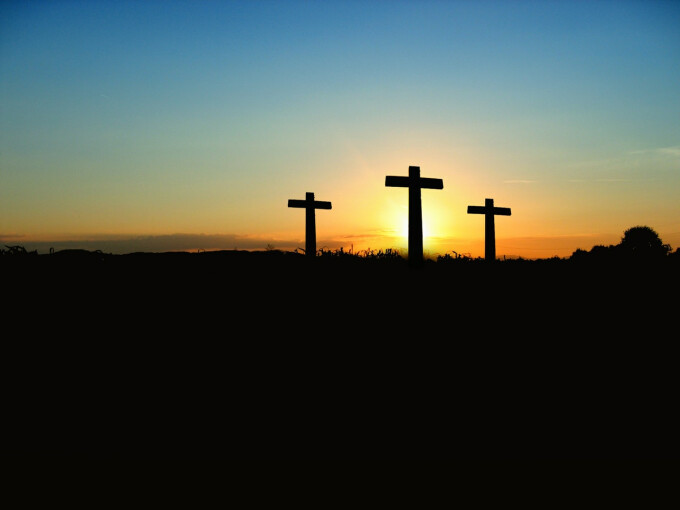The Worth of Christ's Death

Question: “How does the death of Jesus Christ pay the penalties for all the sins of all of God’s people?”
Answer: God told Adam and Eve that they would die if they broke His laws. The rest of Scripture continually emphasizes the fact that death is the necessary consequence of our choice to sin against God. “Behold, all souls are mine…the soul who sins shall die.” (Ezekiel 18:4). “For the wages of sin is death…” (Romans 6:23). “Death” in Scripture sometimes means the end of physical life, but ultimately it means the eternal suffering of body and soul in hell, separated eternally from God’s favor. And since “all have sinned and fall short of the glory of God,” everyone deserves to die eternally.
If eternal physical and spiritual death seems a severe penalty for the sins that we’ve committed it’s only because, as sinners, we are blind to the gravity and hideousness of our sin. To reject God’s authority and pursue our own glory instead of His is to commit “cosmic treason.” The seriousness of an offense rises exponentially with the importance and dignity of the one who is offended. If you spit in my face, I may rebuke you, but that would be the extent of your punishment. If you spit in the face of a policeman, you may end up in jail for a little while. If you spit in the face of the President of the United States or the Queen of England, you will definitely spend a long time in prison. Imagine what the sufficient penalty would be for our far more serious offenses against the infinitely holy God of the universe!
God has, in His grace, provided only one way for sinful human beings to avoid the penalty of physical and spiritual death that their sins deserve – He provides an adequate substitute who would qualify to die in the place of the guilty sinner. The Lord pointed to this salvation-by-the-death-of-a-substitute when He required the Israelites to present bloody sacrifices of blemish-free animals in order to know and worship Him. He makes it clear in Leviticus 17:11 that “atonement” (reconciling God and sinner by satisfying God’s wrath against sin) requires the death of a God-appointed substitute – “For the life of the flesh is in the blood, and I have given it for you on the altar to make atonement for your souls, for it is the blood that makes atonement by the life.” As it is written in Hebrews 9:22, “Indeed, under the law almost everything is purified with blood, and without the shedding of blood there is no forgiveness of sins.”
However, the animal sacrifices of the Old Testament were clearly not sufficient to accomplish atonement between God and sinners. As the writer of Hebrews points out, “…in these sacrifices there is a reminder of sin every year. For it is impossible for the blood of bulls and goats to take away sins.” Men and women are made in God’s image and are therefore of far greater value than the other creatures that God has made.
Only the sacrifice of a perfect, sinless man could possibly serve as an adequate sacrifice for the life of a guilty sinner. And this is what God the Father provided when He sent His Son, our Lord Jesus Christ, to die on the cross in our place as our substitute. “But when Christ had offered for all time a single sacrifice for sins, He sat down at the right hand of God…For by a single offering He has perfected for all time those who are being sanctified.” (Hebrews 10:12-14).
How do we get this “salvation-by-the-death-of-Christ-our-Substitute?” Jesus made this abundantly clear in John 5:24, “Truly, truly, I say to you, whoever hears My word and believes Him who sent Me has eternal life. He does not come into judgment, but has passed from death to life.” Believe in Him as your crucified and risen Lord and put all your hope in Him.
This begs one more question: how is Christ’s one life offered-up on the cross sufficient to pay for the sins committed by millions of those who place their faith in Him? Look at it this way: If I were to give you a quarter, you could go to the grocery store and get one piece of (small) candy in return. But what if I gave you a 1933 Gold Double Eagle coin, one of which was sold at an auction several years ago for $7,590,000? How many pieces of candy could you buy with one of those?
Jesus Christ is fully God and fully man, so His perfect human and divine life is infinitely more valuable than your life and therefore sufficient to pay for the sins of all of God’s people in every age. Add to this picture that your life was so corrupted and stained by sin that it was worthless, like a filthy rag in the sight of God (Isaiah 64:6). But the beauty of God’s grace is that, as Paul says, “…while we were still weak, at the right time, Christ died for the ungodly. For one will scarcely die for a righteous person – though perhaps for a good person one would dare even to die – but God shows his love for us in that while we were still sinners, Christ died for us.” (Romans 5:6-8).

